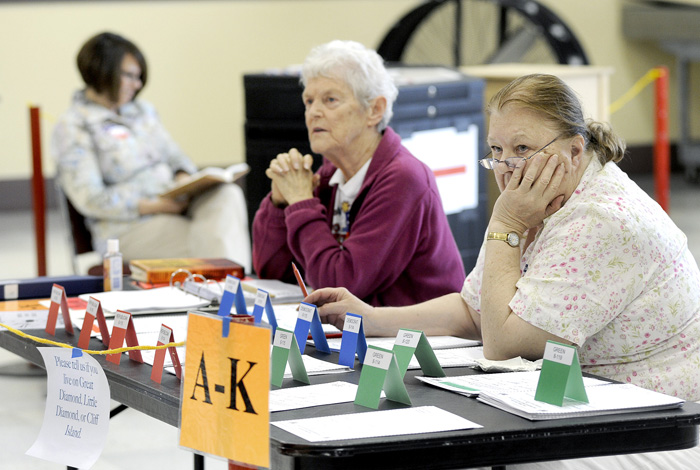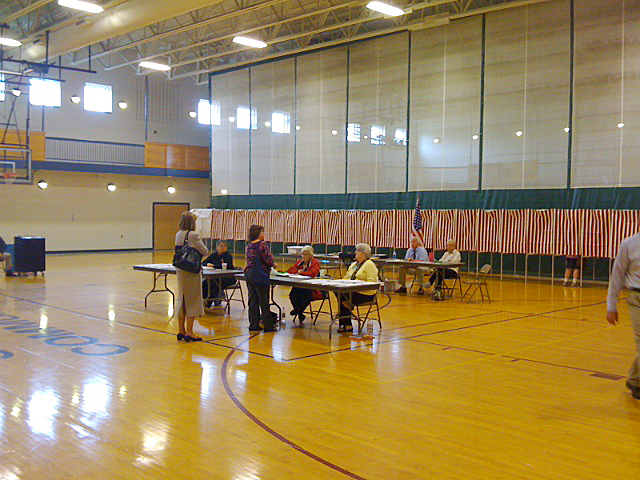PORTLAND — About 10.2 percent of the registered voters in Maine’s largest city cast a ballot today, which is a total of 4,999 voters, according to Portland’s election administrator.
“I can’t imagine it being this slow at this point at any time in the past decade,” Bud Philbrick said around noon.
That turnout is significantly down from the June 2010 primaries, when 13,477 voted, or about a 26 percent turnout, according to the city clerk’s office.
The race for the U.S. Senate is today’s main draw as voters decide which Republican and Democratic candidates will appear on November’s ballot for U.S. Senate and House elections.
Six Republicans and four Democrats seeking to fill the seat being vacated by Sen. Olympia Snowe are participating in the primary election today. The GOP also had contested primaries in both of the state’s two congressional districts.
The Senate race has generated the most interest, with Snowe’s decision to not seek a fourth term and former Gov. Angus King’s decision to run as an independent.
Peter Gaulke, a left-leaning Republican in Portland, said he couldn’t vote for any of the GOP candidates on the ballot so he wrote in King’s name.
“I’d just like to see people be more pragmatic. Ideology has gone too far,” Gaulke said. “People can rail against the government but we are the government – of the people, by the people, for the people. People need to get the work done and stop worrying about ideology. It’s not helping anybody.”
Many voters view King as difficult to beat. And Democrats worry that King, a former member of their party, could siphon off Democratic votes and give Republicans an advantage.
“The reality is that I do think Angus King will win the general election,” said Elizabeth Simpson, a Democrat who said she’d vote for King if necessary to keep the Senate out of GOP hands.
The lack of participation led one voter to ponder the reasons.
“It’s obviously a sad sight,” said Alex Beinstein, who recently moved to the city to attend law school.
Beinstein, who is 23 years old, said young people seem disillusioned with the political process. That helps explain the low turnout, he said.
But Beinstein also acknowleged the impact of King. Residents who plan to vote for him in the November general election are staying away, he speculated.
Beinstein, however, feels King, who is 68, is too old to be an effective, long-term leader in the Senate. He voted for Dill.
Charlie Thayer, a poll warden in Bangor, said he was surprised to see such low turnout on Tuesday given the fact that there is an open U.S. Senate seat and 10 strong candidates from the two major parties on the ballot.
There was light traffic at many polling places in Portland too, in keeping with state election officials’ prediction of a turnout of less than 20 percent of registered voters.
In Portland’s Merrill Auditorium, typically a busy voting location, 60 people – fewer than 2 percent of registered voters in that precinct – had come in by noon.
Carol Morrissette, the poll warden, said she was hoping for a spike at the end of the work day. At noon, eight poll workers sat waiting for voters in an otherwise empty room.
“We’re here and happy to give people their ballots,” she said.
Many Senate candidates said large numbers of voters still haven’t made up their minds, leaving the outcomes up in the air.
“There are so many undecided voters. I don’t see how anyone can think they have an edge,” said state Sen. Debra Plowman, a Republican who estimated that four in 10 voters are undecided based on her phone calls. “It means anyone can win in my book. We haven’t given up.”
In addition to Plowman, the candidates in the Republican Senate primary were Rick Bennett, CEO of a corporate watchdog firm; small businessman Scott D’Amboise; state Treasurer Bruce Poliquin; Attorney General William Schneider; and Secretary of State Charlie Summers.
Running in the Democratic primary are state Sen. Cynthia Dill; former Secretary of State Matt Dunlap; state Rep. Jon Hinck; and home builder Benjamin Pollard.
In the Republican House primaries, state Sen. Jon Courtney faced merchant mariner Patrick Calder in the 1st District, and Senate President Kevin Raye faced Navy veteran and building contractor Blaine Richardson in the 2nd District.
The candidates continued their campaigning today after spending Monday on talk radio shows, meeting with voters on downtown streets and working the phones.
Summers stopped at coffee shops and diners in Cumberland and York counties, while Bennett stopped at businesses and met residents in walks through downtowns in central and southern Maine.
D’Amboise also walked downtown districts in central Maine and planned to wave campaign signs with supporters during the afternoon rush hour in Topsham.
Plowman campaigned in the Bangor area and sent email and Facebook messages to supporters. Poliquin worked with volunteers in Damariscotta making phone calls to solicit support. Schneider had a busy primary day planned.
On the Democratic side, candidates worked the phones and met with supporters Monday.
The primaries are a pivotal first step toward determining who will replace Snowe as Maine enters a new political era of representation in Washington, said David Stearns, a Republican business owner from Kennebunk.
“This is a critical election,” said Stearns. “I think this primary is important to see who’ll face Angus King.”
Associated Press writer David Sharp in Portland contributed to this report.
Send questions/comments to the editors.




Comments are no longer available on this story